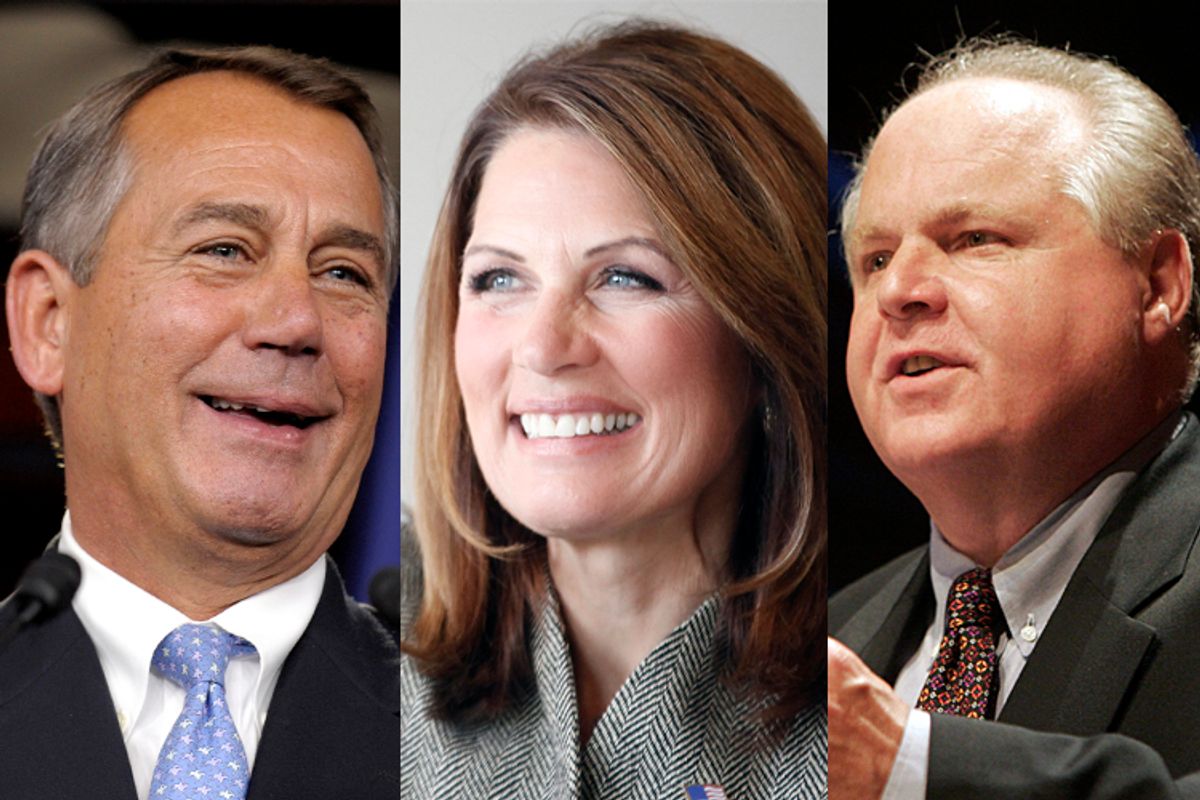There was a time, about two summers ago, when Republicans in Congress opposed the president for a reason. The reason wasn’t exactly an honorable or stirring one, but at least it had a logic to it. The thinking, reportedly articulated by Paul Ryan among others, went a little something like this: Any grand bargain, no matter how tilted to the right wing, would only help Obama win reelection. But all-out intransigence, when paired with a weak economy and looming debt, would make Obama look ineffectual, weak, and in over his head. And that was the way back to 1600 Penn.
But then Mitt Romney happened, and we all know how that went.
Cut to yesterday, more than two years later, and depressingly little has changed. There Obama stands; still president, still trying, and still finding no serious partner with whom to bargain. But whereas the original grand bargain was truly sweeping in its ambitions, trading (too few) tax hikes for (too many) cuts to social insurance programs like Medicare and Social Security, this latest iteration of what some have called the president’s white whale is far more modest. And yet Republican resistance is, if anything, even firmer.
This time around, Obama is essentially asking to trade a cut to corporate tax rates in exchange for greater investment in jobs programs and public infrastructure. It’s a perfectly sensible deal, too, one in which each side gets something they’ve long wanted, and each side gives the other something they’d, in a perfect world, probably rather not. Needless to say, Republicans hate it.
“I don’t think [Obama’s] been acting in good faith. I really don’t,” Senator Orrin Hatch, Utah’s hard-right senior senator, told Roll Call. Speaker Boehner’s spokesman was likewise negatively inclined, calling the proposal a means to allow “President Obama to support President Obama's position on taxes and President Obama's position on spending, while leaving small businesses and American families behind." Other Republican comments were much the same, with the identical combination of airy dismissal and overzealous focus on Obama himself, rather than on his proposal.
At this point, after years of nearly all-out opposition from Republicans to most anything Obama’s tried to do, the temptation to give up and embrace a jaded apathy is a strong one. It’s become second nature to assume the GOP will do whatever it can to oppose the president, even when their own long-term interests align with his (see: immigration reform). But we should resist this lapse into indifference, if for no other reason than this: America’s is a two-party system. Sooner or later, the Republicans are going to win.
It’s therefore a big deal when the GOP shirks all responsibility for governing, mostly because they reject that November 2012 (or 2008, for that matter) ever happened. It’s a big deal when the litmus test for Republicanism becomes opposition to anything and everything one man attempts, with what’s best for the people coming a distant second. It’s a big deal when a party that runs 30 of 50 state governments behaves such that even sympathetically inclined commentators, like The New York Times’ Ross Douthat, call it more a faction than a real political party. As Douthat wrote after the farm bill fiasco:
But without a vision of the common good, a party is basically just a faction, seeking only the interests of its constituents, with no sense of its responsibilities to the country as a whole. And the Obama-era Republican Party’s worst tendency has been toward just this sort of factionalism: Not an ideological extremism, exactly, but rather a vision of government that you might call “small government for thee, but not for me,” in which conservatism is just constituent services for the most reliable Republican groups and voters.
Yet even Douthat’s definition of a faction may not fit, because what could be a more highly prized “constituent service” for the GOP than lowering corporate taxes? No, it wasn’t the farm bill that showed Republicans as irrevocably oppositional. It wasn’t even immigration reform, where promises of benefits to Republicans are often airy and abstract and thus justifiably dismissed. It’s wasn’t either of these high-profile legislative fails, but the damned grand bargain — yet again — that made clear the mess of U.S. government.



Shares